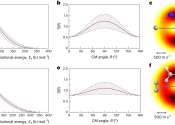Scientists help unravel life's cosmic beginnings
Knowledge about the early forms of life in the universe that may have led to the development of life on Earth remains largely unknown. However, a group of scientists at the University of Hawaiʻi at Mānoa are attempting ...

